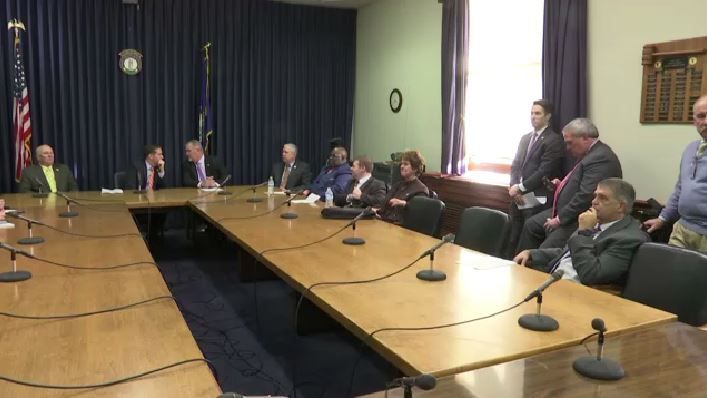FRANKFORT- A comprehensive school safety bill has been filed.
Sen. Max Wise, R-Campbellsville, is sponsoring Senate Bill 1, called the "School Safety and Resiliency Act".
While presenting the bill to members of the media Wednesday, Senate President Robert Stivers, R-Manchester, called this bill the top priority of the short session.
"Democrat or Republican, House or Senate, this is not a child of the party, this is not a child of a chamber," he said. "This is a child and a teacher of Kentucky."
The bill is designed with feedback from the School Safety Task Force which met all summer hearing from teachers, students, law enforcement and more.
The 30-page bill will serve as framework for subsequent measures to pass in other sessions. It is broken into four different parts, Personnel, Systems & Structures, A Culture of Student Connection, and Accountability.
The first section focuses on providing more school resource officers and mental health professionals in schools. It also requires districts to appoint a district-level "school safety coordinator" who will receive a common state training, and administer local school safety training, recommended structures and protocols, and a school safety threat assessment team.
The second part of bill deals with systems and structures, which details practices schools must adhere to. It would also create an anonymous reporting tool or "tipline" for threats to be posted to. A major part of this section is dealing with hoaxes and fake threats on schools. These acts could be treated as acts of terrorism.
Third, a culture of student connection. There are several aspects included in this section, to begin with students from grades 6 through 12 will have to receive suicide prevention awareness information either through video or live presentation. All staff will be required to have at least one hour of suicide prevention training, to learn the signs and symptoms of mental illness. A mental health professional will also be in all schools by July 1, 2021. Finally, school boards will be required to develop a plan to adopt "trauma-informed approaches in schools".
Finally, accountability. This part establishes the sanctions for schools that fail to comply with submitting safety risk assessments or for correcting safety deficiencies among other things.
A state security marshal would be created, this position would serve as way to make sure schools are following the recommended safety guidelines, if a school is found out of compliance, they would be penalized. What those penalties would be is still undetermined.
"It's not an attempt to say 'gotcha' or anything, but there has to be some accountability," said Rep. John 'Bam' Carney, R-Campbellsville. "This is going to allow someone to come in and basically say there is some consequences if you don't do such."
Of course--this all depends on funding. There has been a fiscal note requested but Sen. Wise says he can't determine how much this bill will cost.
"The legislature is going to have to look at funding mechanism if we are wanting to make this a priority as it deals with funding, we are going to have to be serious about that," he said. "The pension issue looms large over this state. That prohibits us from doing a lot things in this state and unfortunately, that is the state that we are in right now, and so we are going to have to look at what the funding will be."
Any funding required for this bill will have to be passed in 2020 during the budget session.
"We got the framework here. Everything is going to be contingent on funding, but we wanted just to have the shell of the bill is place to go ahead and start looking at the issues right now in the 30 day session," Sen. Wise said.
Sen. Wise says this plan will likely go too far for some people, and others will think it doesn't go far enough.
"This is a starting point, anytime we put a bill out there it's going to be very hard to get 138 people to agree upon when it first comes out," said Sen. Wise. "I think that's where we are going to have to continue to let the process run its course. We will come back, when we come back in February, and look at what more additional input we have heard already that can address those issues maybe we have overlooked."



